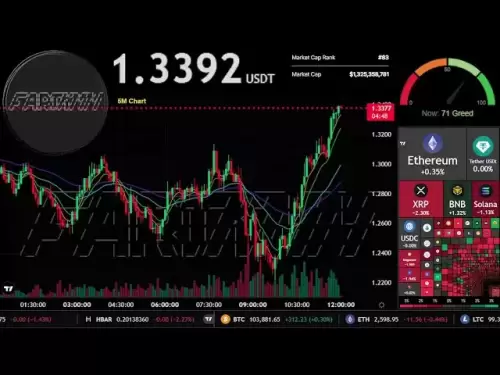-
 Bitcoin
Bitcoin $103,461.9964
-0.12% -
 Ethereum
Ethereum $2,537.5510
-2.52% -
 Tether USDt
Tether USDt $1.0001
0.01% -
 XRP
XRP $2.4410
-4.95% -
 BNB
BNB $652.8106
0.09% -
 Solana
Solana $169.7638
-4.18% -
 USDC
USDC $0.9999
0.01% -
 Dogecoin
Dogecoin $0.2212
-5.37% -
 Cardano
Cardano $0.7671
-4.26% -
 TRON
TRON $0.2737
-1.13% -
 Sui
Sui $3.8721
-1.74% -
 Chainlink
Chainlink $16.0805
-5.83% -
 Avalanche
Avalanche $23.4509
-7.03% -
 Stellar
Stellar $0.2952
-3.54% -
 Shiba Inu
Shiba Inu $0.0...01484
-6.33% -
 Hyperliquid
Hyperliquid $25.7519
2.42% -
 Hedera
Hedera $0.1985
-4.82% -
 UNUS SED LEO
UNUS SED LEO $8.8777
-0.40% -
 Bitcoin Cash
Bitcoin Cash $394.9626
-2.62% -
 Toncoin
Toncoin $3.0899
-5.20% -
 Polkadot
Polkadot $4.7900
-4.61% -
 Litecoin
Litecoin $99.1877
-2.07% -
 Pi
Pi $0.8848
-6.79% -
 Monero
Monero $339.5602
-0.64% -
 Bitget Token
Bitget Token $4.8316
1.75% -
 Pepe
Pepe $0.0...01312
-5.97% -
 Dai
Dai $1.0000
0.01% -
 Ethena USDe
Ethena USDe $1.0005
0.00% -
 Uniswap
Uniswap $6.2412
-5.50% -
 Bittensor
Bittensor $438.1875
-2.98%
Is cloud mining reliable? What are the risks?
Cloud mining can be reliable with reputable providers, but risks include scams, crypto price volatility, technical issues, and regulatory changes. Research thoroughly before investing.
May 15, 2025 at 11:43 pm
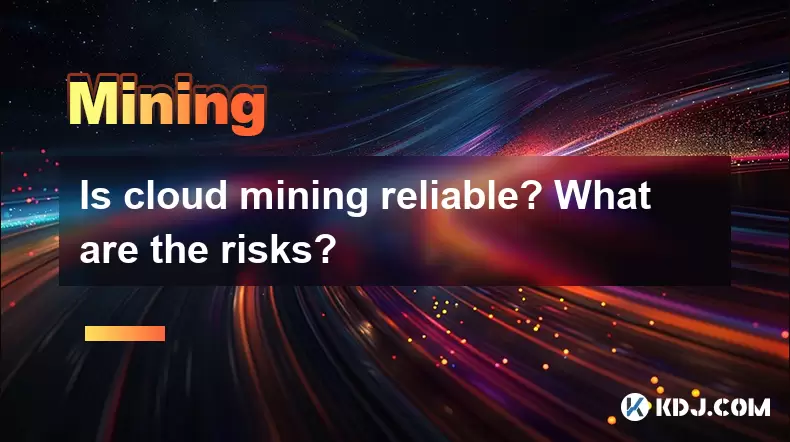
Is cloud mining reliable? What are the risks?
Cloud mining has become a popular method for individuals to participate in cryptocurrency mining without the need for expensive hardware or technical expertise. However, the reliability of cloud mining and the associated risks are topics of significant debate within the cryptocurrency community. This article delves into the reliability of cloud mining and outlines the various risks that potential investors should be aware of.
Understanding Cloud Mining
Cloud mining is a process where individuals rent computing power from a company that operates mining hardware in a data center. This allows users to mine cryptocurrencies like Bitcoin, Ethereum, and others without having to purchase and maintain their own mining equipment. The concept is appealing because it lowers the entry barrier for mining, making it accessible to a broader audience.
The reliability of cloud mining largely depends on the provider. Reputable providers with a track record of transparency and consistent payouts are generally more reliable. However, the industry is also rife with scams and fraudulent schemes, which can make it challenging to distinguish between legitimate and dubious operations.
Factors Affecting Reliability
Several factors can influence the reliability of cloud mining services:
Provider's Reputation: A provider's history and reputation in the industry can be a good indicator of reliability. Researching reviews and testimonials from other users can provide insights into the provider's track record.
Transparency: Reliable providers are transparent about their operations, including the location of their data centers, the type of hardware used, and the mining pools they participate in. Lack of transparency can be a red flag.
Contract Terms: The terms of the mining contract, including the duration, fees, and payout structure, should be clear and fair. Hidden fees or overly complex terms can indicate a less reliable service.
Customer Support: Good customer support is crucial for resolving issues and answering questions. Reliable providers typically offer responsive and helpful support.
Risks Associated with Cloud Mining
While cloud mining can be an attractive option, it comes with several risks that potential investors should consider:
Scams and Fraud: The cryptocurrency industry has seen numerous cloud mining scams where companies take payments for mining contracts but fail to deliver the promised returns. Always conduct thorough research before investing in any cloud mining service.
Volatility of Cryptocurrency Prices: The profitability of cloud mining is heavily dependent on the price of the cryptocurrency being mined. If the price drops significantly, the returns from mining may not cover the costs of the contract.
Technical Risks: Even with reputable providers, technical issues such as hardware failures or downtime can affect mining operations and reduce profitability.
Regulatory Risks: The legal status of cloud mining can vary by country, and changes in regulations can impact the viability of cloud mining operations. Investors should be aware of the legal environment in their jurisdiction.
Evaluating Cloud Mining Providers
To assess the reliability of a cloud mining provider, consider the following steps:
Research the Provider: Look for reviews and testimonials from other users. Websites like Trustpilot and forums like Bitcointalk can provide valuable insights.
Check for Transparency: Visit the provider's website and look for detailed information about their operations. Reliable providers will provide clear information about their hardware, data centers, and mining pools.
Review Contract Terms: Carefully read the terms of the mining contract. Pay attention to the duration, fees, and payout structure. If anything seems unclear or unfair, it may be best to look elsewhere.
Assess Customer Support: Test the provider's customer support by asking questions or seeking clarification on their services. Responsive and helpful support is a good sign of reliability.
Mitigating Risks in Cloud Mining
While it's impossible to eliminate all risks associated with cloud mining, there are steps you can take to mitigate them:
Diversify Investments: Instead of putting all your funds into one cloud mining contract, consider diversifying across multiple providers and cryptocurrencies. This can help spread the risk.
Monitor Performance: Regularly check the performance of your mining contracts. If you notice consistent underperformance or issues with payouts, it may be time to reassess your investment.
Stay Informed: Keep up to date with the latest news and developments in the cryptocurrency and cloud mining industries. Being informed can help you make better investment decisions and avoid potential scams.
Set Realistic Expectations: Understand that cloud mining is not a guaranteed way to make money. Set realistic expectations about potential returns and be prepared for the possibility of losses.
Real-World Examples of Cloud Mining
To provide a clearer picture of the reliability and risks of cloud mining, let's look at a few real-world examples:
Genesis Mining: One of the more well-known cloud mining providers, Genesis Mining has been in operation since 2013. They offer a range of mining contracts for different cryptocurrencies and have a reputation for transparency and reliability. However, like all cloud mining operations, their profitability can be affected by cryptocurrency price volatility.
Hashflare: Hashflare was once a popular cloud mining provider but shut down in 2018 after facing numerous issues, including allegations of fraud. This example highlights the risks of investing in cloud mining services, as even established providers can fail.
NiceHash: NiceHash operates a marketplace where users can buy and sell hashing power. While not a traditional cloud mining service, it offers a way to participate in mining without owning hardware. NiceHash has faced its own challenges, including a significant hack in 2017, but has since recovered and continues to operate.
Frequently Asked Questions
Q: Can I make a profit from cloud mining?
A: It is possible to make a profit from cloud mining, but it depends on various factors such as the price of the cryptocurrency being mined, the terms of the mining contract, and the reliability of the provider. Profitability is not guaranteed and can be affected by market volatility and operational risks.
Q: How do I know if a cloud mining provider is legitimate?
A: To determine if a cloud mining provider is legitimate, conduct thorough research. Look for reviews and testimonials from other users, check for transparency in their operations, and carefully review the terms of their mining contracts. Be wary of providers that promise unusually high returns or lack clear information about their services.
Q: What should I do if I suspect a cloud mining provider is a scam?
A: If you suspect a cloud mining provider is a scam, stop investing immediately and report your concerns to relevant authorities. Document any interactions and transactions with the provider, as this information can be useful in any potential investigations or legal actions.
Q: Are there any alternatives to cloud mining?
A: Yes, there are alternatives to cloud mining. You can purchase your own mining hardware and set up a home mining operation, join a mining pool, or invest in mining-related stocks or funds. Each option has its own set of risks and rewards, so it's important to research and understand them before making a decision.
Disclaimer:info@kdj.com
The information provided is not trading advice. kdj.com does not assume any responsibility for any investments made based on the information provided in this article. Cryptocurrencies are highly volatile and it is highly recommended that you invest with caution after thorough research!
If you believe that the content used on this website infringes your copyright, please contact us immediately (info@kdj.com) and we will delete it promptly.
- Solana co-founder's bold proposal for a meta-blockchain could redefine the Layer 2 narrative – just as Solaxy's presale gains traction with a $35M raise.
- 2025-05-16 05:10:13
- As institutional giants double down on Bitcoin, a meme coin with real BTC rewards is gaining traction among smart retail investors.
- 2025-05-16 05:10:13
- Banks need to be part of crypto for stablecoins to succeed
- 2025-05-16 05:05:13
- Tradoor, the First Triple Perps, Options, and SocialFi DEX on TON, Announces $3.2M in Total Funding
- 2025-05-16 05:05:13
- While the crypto market is still in a bull run, prices saw a sharp decline this week.
- 2025-05-16 05:00:13
- Theta Network to Host Community, Partner and Developer Meetup in Munich on May 27th
- 2025-05-16 05:00:13
Related knowledge
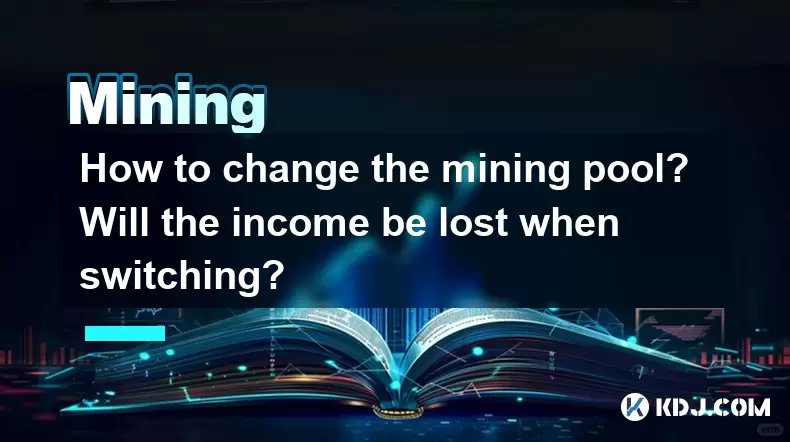
How to change the mining pool? Will the income be lost when switching?
May 16,2025 at 01:50am
Changing your mining pool can be a strategic move to optimize your mining operations. Whether you're looking to switch due to better pool fees, more reliable payouts, or other reasons, it's important to understand the process and its implications on your mining income. In this article, we'll guide you through the steps to change your mining pool and dis...
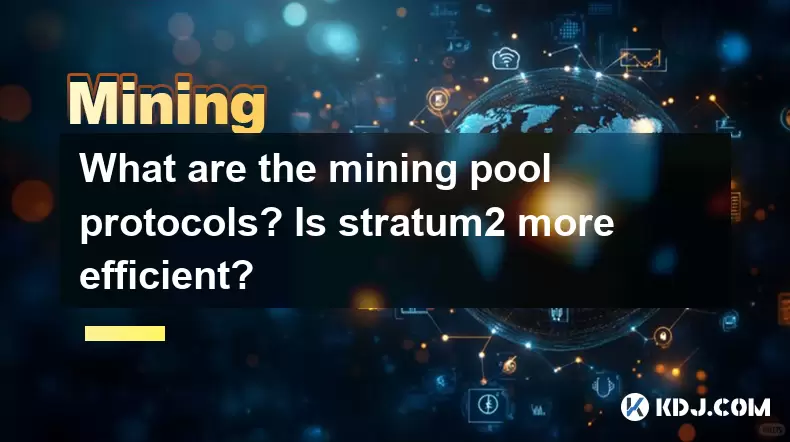
What are the mining pool protocols? Is stratum2 more efficient?
May 15,2025 at 03:35pm
Mining pool protocols are essential components of cryptocurrency mining operations, allowing miners to work together and share resources to increase their chances of earning rewards. The most commonly used protocols include Stratum, Stratum V2 (also known as Stratum2), and Getwork. Each protocol has its own set of features and efficiencies, which can si...
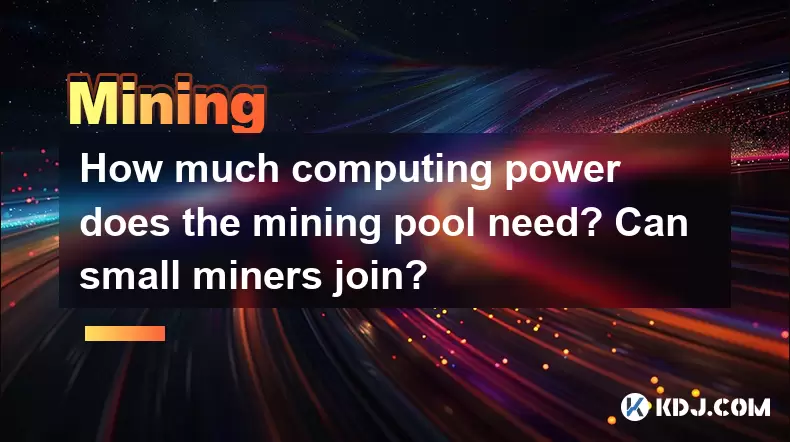
How much computing power does the mining pool need? Can small miners join?
May 15,2025 at 07:29pm
The world of cryptocurrency mining is both fascinating and complex, with mining pools playing a crucial role in the ecosystem. One of the most common questions that arise is: How much computing power does a mining pool need? Additionally, many small miners wonder if they can join these pools. Let's delve into these topics in detail. Understanding Mining...
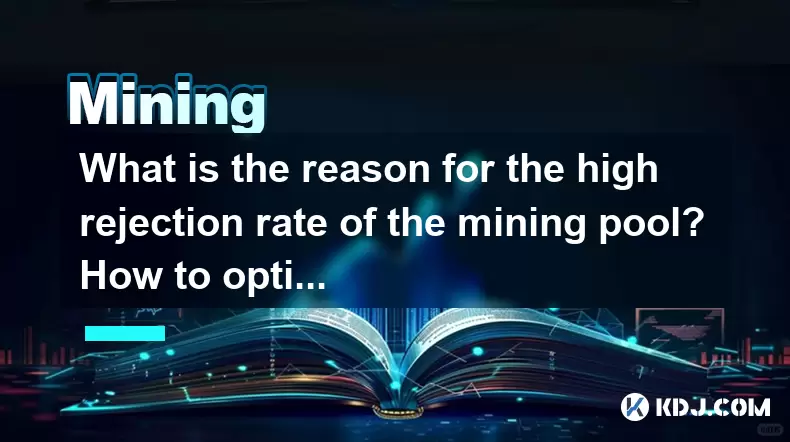
What is the reason for the high rejection rate of the mining pool? How to optimize?
May 15,2025 at 11:35am
The high rejection rate of a mining pool is a common concern for many cryptocurrency miners. Rejection rates refer to the percentage of submitted shares that are rejected by the mining pool. A high rejection rate can significantly impact a miner's profitability and efficiency. In this article, we will explore the reasons behind high rejection rates and ...
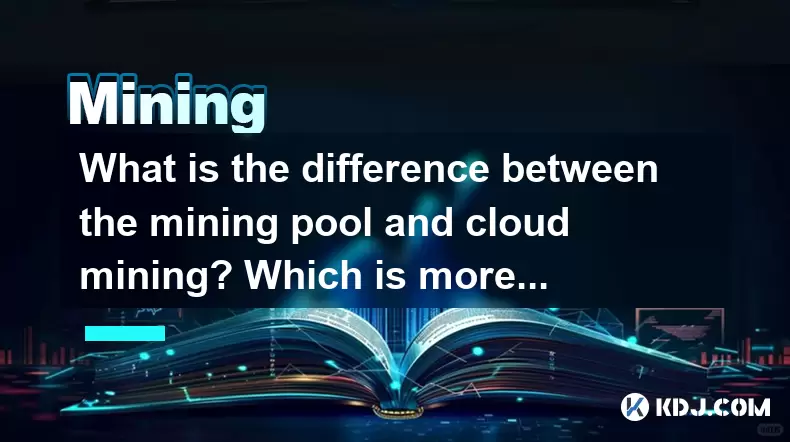
What is the difference between the mining pool and cloud mining? Which is more suitable for novices?
May 14,2025 at 08:56pm
Mining in the cryptocurrency world refers to the process of verifying transactions and adding them to the blockchain, which in turn releases new coins as a reward. Two popular methods of participating in this process are through mining pools and cloud mining. Both have their own set of characteristics, advantages, and disadvantages. This article aims to...

What currencies does the mining pool support? Can you mine niche coins?
May 16,2025 at 05:28am
Mining pools are essential components of the cryptocurrency ecosystem, allowing miners to combine their computational resources to increase their chances of earning rewards. One of the primary considerations for miners when choosing a mining pool is the variety of currencies supported. This article will explore the currencies that mining pools typically...

How to change the mining pool? Will the income be lost when switching?
May 16,2025 at 01:50am
Changing your mining pool can be a strategic move to optimize your mining operations. Whether you're looking to switch due to better pool fees, more reliable payouts, or other reasons, it's important to understand the process and its implications on your mining income. In this article, we'll guide you through the steps to change your mining pool and dis...

What are the mining pool protocols? Is stratum2 more efficient?
May 15,2025 at 03:35pm
Mining pool protocols are essential components of cryptocurrency mining operations, allowing miners to work together and share resources to increase their chances of earning rewards. The most commonly used protocols include Stratum, Stratum V2 (also known as Stratum2), and Getwork. Each protocol has its own set of features and efficiencies, which can si...

How much computing power does the mining pool need? Can small miners join?
May 15,2025 at 07:29pm
The world of cryptocurrency mining is both fascinating and complex, with mining pools playing a crucial role in the ecosystem. One of the most common questions that arise is: How much computing power does a mining pool need? Additionally, many small miners wonder if they can join these pools. Let's delve into these topics in detail. Understanding Mining...

What is the reason for the high rejection rate of the mining pool? How to optimize?
May 15,2025 at 11:35am
The high rejection rate of a mining pool is a common concern for many cryptocurrency miners. Rejection rates refer to the percentage of submitted shares that are rejected by the mining pool. A high rejection rate can significantly impact a miner's profitability and efficiency. In this article, we will explore the reasons behind high rejection rates and ...

What is the difference between the mining pool and cloud mining? Which is more suitable for novices?
May 14,2025 at 08:56pm
Mining in the cryptocurrency world refers to the process of verifying transactions and adding them to the blockchain, which in turn releases new coins as a reward. Two popular methods of participating in this process are through mining pools and cloud mining. Both have their own set of characteristics, advantages, and disadvantages. This article aims to...

What currencies does the mining pool support? Can you mine niche coins?
May 16,2025 at 05:28am
Mining pools are essential components of the cryptocurrency ecosystem, allowing miners to combine their computational resources to increase their chances of earning rewards. One of the primary considerations for miners when choosing a mining pool is the variety of currencies supported. This article will explore the currencies that mining pools typically...
See all articles























